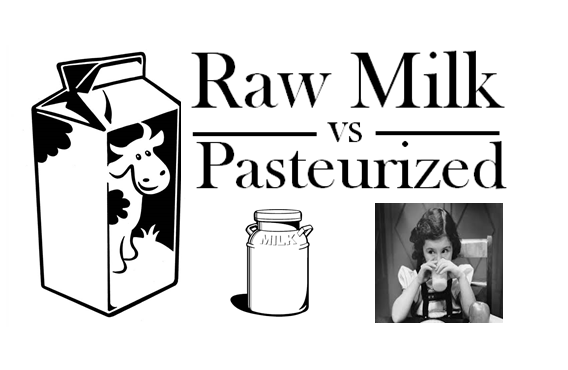
Is pasteurization destructive to the nutritional quality of your milk, which milk is better raw milk or conventionally, pasteurized milk? A dairy farmer’s perspective to these important questions
During the 19th and 20th century, food borne illnesses became a serious problem. While milk is a perfect food for people, it’s also a perfect food for bacteria. With more and more people moving to cities, and getting more distant from the source of their food, it became more important to solve spoilage issues, and extend the shelf life of foods. Our food distribution systems were having new problems.
Pasteurization was developed to increase the safety of milk and dairy products. But there is a debate whether this has affected the healthfulness of our milk.
Does pasteurization affect Milk
A simple Google search will show that there is a lot of controversy about pasteurization and its effect on milk.
Interestingly, pasteurization has not been proven to change the nutrition of the milk in any significant way. The nutritional components in the milk stay roughly the same. The protein and fat in milk are not affected, and there is only a slight reduction of vitamins, mainly a slight loss of vitamins A, C, B, and Folic Acid.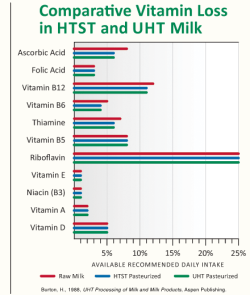
A study published in the Food Control Journal titled “Raw or heated cow milk consumption: Review of risks and benefits” did not find any support for the notions held that pasteurization compromises the nutritional value of the milk. The researchers concluded that those arguments can be refuted. (source) The study reviewed many health aspects (nutritional value, immunity, allergies, lactose intolerance, diabetes, milk digestibility, etc.), but found that the only major differences between raw and pasteurized milk were sensory characteristics i.e. taste and smell.
Some researchers have found that heat (through pasteurization) will reduce some of the enzymes that are in milk. Some of these enzymes help aid milk digestion, and calcium absorption. However, research on heats effect on the enzymes present in milk hasn’t been conclusive. Pasteurization’s effects on these components of milk need further research.
It seems natural to assume that milk in its natural raw state would be a healthier product. A European study named GABRIELA was done with 8,000 children to study the differences in raw milk drinkers as compared to pasteurized milk drinkers. According to one article:
Some lived in quaint villages and typically drank supermarket milk. Others lived on farms and often drank raw milk. The researchers gathered samples of milk from family fridges across the Alps and gave them to their colleagues for blind testing of the fat content, whey proteins, and bacterial count. GABRIELA found substantive evidence that raw milk-consuming farm kids were much less likely to develop allergies including asthma and dermatitis during childhood. (source)
Even though the study suggested that the raw milk drinkers were healthier, it’s not conclusive. The kids in each group were subject to different environments. The study presents a new topic of discussion – is our modern hand-sanitize nation weakening our immune systems. The farm kids in the study may have been healthier due to the simple fact that they were being exposed to far more bacteria. The farm kids had far stronger more active immune systems.
Raw Milk vs. Pasteurized Milk
But this exposure to bacteria could easily become a negative experience. Pasteurized milk is the safest form of milk. Pasteurization reduces the bacterial load in the milk, kills pathogenic bacteria (like e-coli), and stops foodborne illness in its tracks. While only 1% of the U.S. population consumes raw milk and dairy, the CDC noted that 56% of foodborne illness came from the consumption of unpasteurized products. There are many outbreaks of illness due to raw milk. Unpasteurized milk can quickly become a large public health risk.
Left: the 1%, only 1% of the population drinks raw milk in the U.S. (1997) Right: Even though the least consumed, Raw milk leads milk borne outbreaks reported to the CDC in the U.S. (1973-2005)
Both sides of the debate have valid concerns, and we should be exploring all aspects of this debate. Natural, raw milk may indeed be superior in its nutrition, with no denatured or deactivated enzymes. At the same time though, pasteurization is effective in increasing the safety of milk, and has really benefited society as a means to prevent illness. It’s a question of unaltered versus safe.
The challenge is producing and distributing raw milk safely. Bacteria multiply very fast, and raw milk will spoil faster than pasteurized milk. This presents a logistical challenge in delivering raw milk safely to consumers. It generally takes about 24 hours for milk to get from the store to your refrigerator, and when you buy milk, you usually prefer to have a few days to drink it. This is a challenge without pasteurization because with every passing day the bacterial load increases. Raw milk has a very low shelf-life. Your risk increases exponentially with each passing day. Pasteurization reduces this risk, extends the life of milk, makes it possible to distribute, and really does fits well into our society of convenience.
Good vs. Good
Looking at it logically, both raw milk and pasteurized milk provide very similar nutrition, and both are full of nutritional components that benefit your body. You get a similar amount of nutrition from both raw and pasteurized milk.
With no significant difference in the nutrition, you’re basically debating whether good is better than good. Milk in both forms provides good nutrition.
Question: Is nutrient A healthier than nutrient A
Answer: Nutrient A is healthy
Is the marginal difference in nutrition enough for you to stop drinking milk altogether. Compared to every other beverage choice you have, there is no beverage that compares to milk nutritionally. Milk is the most nutritionally packed beverage you can buy.
A glass of milk has roughly 20 percent of your daily protein needs, and a third of your recommended calcium
The choice should be yours whether you want to drink raw or pasteurized milk. Just realize that if you do decide to drink raw milk, there are some safety concerns, and raw milk may even not be allowed to be sold in your state.
If you want to continue reading up on this topic, see the following sources below
Sources:
http://www.realrawmilkfacts.com/raw-milk-hot-topics
http://www.organicvalley.coop/products/milk/pasteurization/








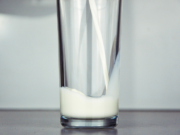








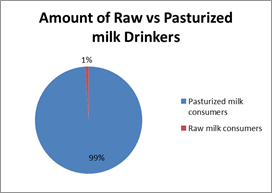
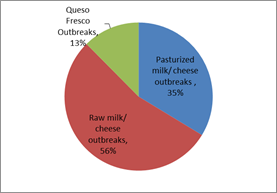
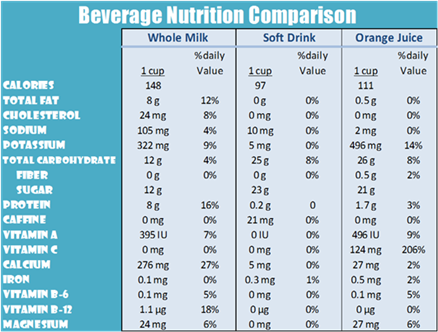





I grew up on raw milk. I am rarely ever sick.
You’re right, research has shown that more exposure to bacteria can strengthen your immune system
Your anecdotal answer is irrelevant
Actually, it’s not. Idiot. His anecdotal evidence is crucial. Because of ppl like him who shared their stories, I have begun to drink raw milk years ago and feel healthier than ever! I introduced all my friends and family to it and they all say the same thing! Anecdotal evidence is relevant you fool.
Very interesting. Thanks
I grew up on (and most often still consume) conventional/commercial milk. I am rarely ever sick. Is my anecdote also crucial evidence in determining whether or not raw milk is qualitatively better and healthier than conventional pasteurized milk? Or is it only the anecdotes of raw-milk drinkers that you consider to be crucial?
Thank you *so much* for writing this. This is the only even handed discussion of this topic that I have been able to find. I think it helped me conclude that to have the best of both worlds, eat yogurt and cheese and drink kefir. This way you are getting the nutritional benefits of dairy while also getting helpful bacteria and enzymes *and* it is (relatively) controlled and safe. They also have a longer shelf life.
Good thoughts! I didn’t think of that but yeah, cheese and yogurt are probiotic treasure troves
Yup! Plus those bacteria produce the enzymes needed to break down lactose. I believe that I read that milk kefir, depending upon how long it has been allowed to culture, can have as little as 10% of its original lactose content remaining. I’m sure that raw milk has different natural enzymes, but if someone is looking for probiotics and enzymes that help digest the milk, yogurt will do that with less concern about listeria.
Interestingly, it is the cultures that learned to make cultured milk products that developed the ability to digest milk products past early childhood. It makes sense. They killed off the pathogenic bacteria by heating the milk and then increased its shelf life and digestiblity by culturing it. Without that technology, people probably would have mostly left the milk to the babies of the cows/goats/sheep before refrigeration. http://nutrigenomics.ucdavis.edu/?page=information/Concepts_in_Nutrigenomics/Lactose_Intolerance
Thanks again for your informative post!
Agree with Melissa, excellent even handed and informative article. Thank you. How does a cow cocky get to be this smart ah? (Just kidding)
Thanks! Cow cocky was a new term for me btw, I had to google it lol
I love raw milk but I get it from a local organic farm where I know they keep modern hygienic standards. Back in the 1800s they often didn’t, so pasteurization was a good thing. In India my grandmother would get raw milk from a local cow – the cow herder brought the cow straight to her door and milked it into the container she provided. Then she would put it into a pan on her stove top and heat it up herself to pasteurize. She did this because it was not her cow, but my Mom told me that when my grandparents owned their own cow they did not heat the milk, since they kept their cow scrupulously clean.
At any rate, I like the taste of raw milk better but if I was not sure of the source I would get pasteurized milk. However, I avoid homogenized milk. I was beginning to get some issues with lactose intolerance, when I switched to raw milk or, when necessary, milk that’s been pasteurized but not homogenized, the issues went away. I am just relating my own personal experience.
At any rate, thanks for your interesting posts. One thing that always worries me is how animals are treated. I have no problem with consuming animal products as long as the animals are humanely treated. It sounds like your cows are well cared for and content.
I avoid homogenized and ultra pasteurized due to body indicators of lower ‘virility’ with homogenized and some inflammation with modest amounts of ultra pasteurized.. I prefer raw, but sometimes pasteurized is good I suppose.
Awesome article! I really like how objective you stayed in pointing out the pros and cons of both sides. Thanks for the info! 🙂
Raw milk creates a film of skin when added to a cup of tea which is not desirable, on balance best to drink Pastureized with less bacteria and a longer shelf life.
> Raw milk creates a film of skin when added to a cup of tea which is not desirable
It is the not pasteurization that makes this difference, but homogenization.
Pasteurization, so-called “safer” “healthier” milk seems to be the one implicated in many of the studies linking milk to negative health effects, so I think I’ll stay with the raw milk. Many of my friends who’ve switched to raw milk report health benefits, so it seems obvious to me when you compare the boatloads of anecdotal experience to the studies that have been churned out so far comparing nutritional content of raw vs. pasteurized milk. Why do the real-world results seem to differ so much if nutritional content is supposedly hardly any different? Think it has anything to do with those enzymes increasing bioavailablity? Or the immune benefits? It’s an interesting question.
The biggest issue with bacteria I imagine comes from not having a strong enough immune system to adapt to new strains of pathogens that will inevitably come from any unprocessed product.
Good point- yeah there was a study I read that found that farm kids got less sick because they were exposed to more bacteria when growing up. Maybe the same with raw milk, just more exposure to more bacteria
Homogenization is the main ‘bad thing’ with milk. If milk’s not homogenized, i.e. not put through the homogenization process, then it’s quite good for nutrition and body integrity, even if not raw. If from quality raised cows, merely pasteurized milk is decent and good.
the CDC statistic is fake – they have an agenda to fulfill
And that agenda is what, exactly?
MILK IS MILK
MILK IS MILK it is both good to drink